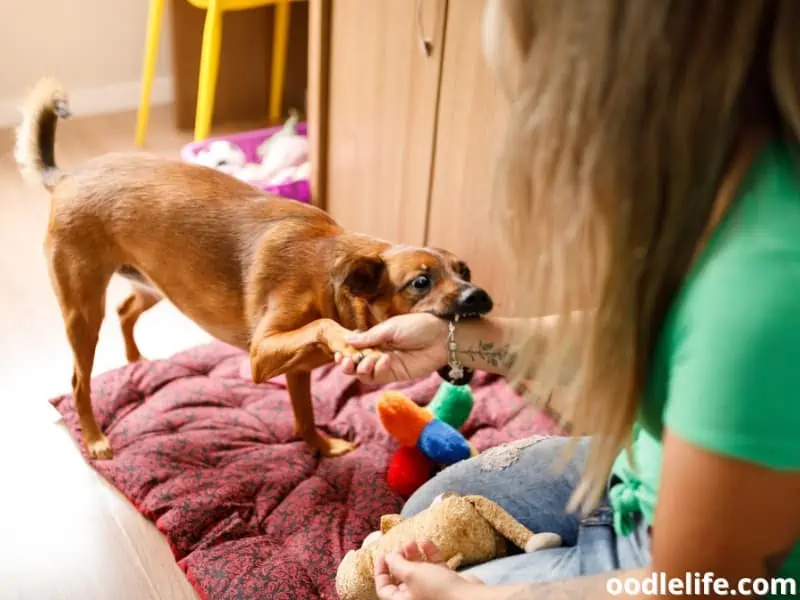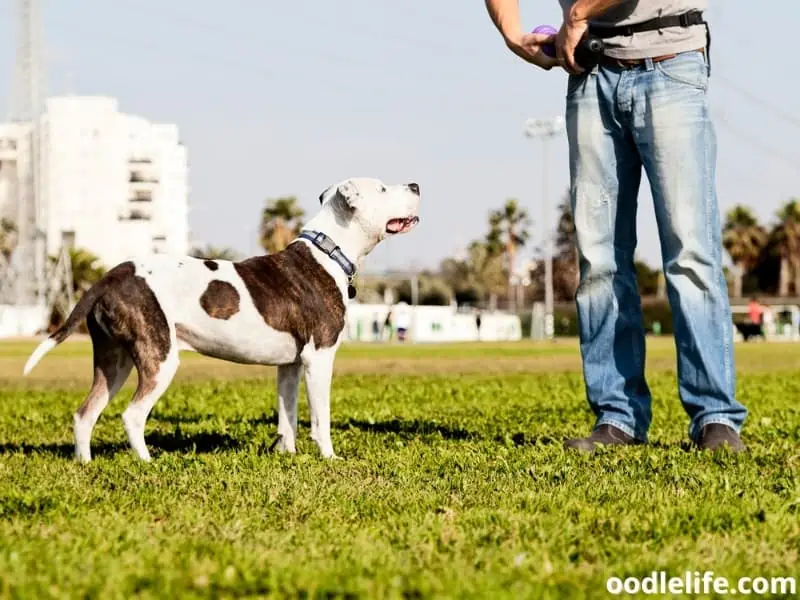Once a Dog Bites, Will It Bite Again?
Behavioral issues are the most common canine problem. Aggressive dogs are known to bite and may cause severe injuries, resulting in costly lawsuits.
If your dog has behavioral problems relating to biting and you’ve been wondering, once a dog bites will it bite again? Keep reading to learn if your canine friend will bite if they have done it before.

Will My Dog Bite Again if They’ve Done It Once?
Yes, when a dog attacks a person, it will likely bite again. Whereas dog bites can happen even during play, most occur when a dog is frightened.

Many dogs will resort to biting when desperate to escape. After biting, most dogs internalize that they could use that defense mechanism again. When your dog bites out of terror, it’s trying to distance itself from the source of fear.
However, some dogs have a high degree of aggression and bite even when not in danger. For instance, a dog bred in a calm adult’s household will likely react negatively to children’s noises and movements. They might attempt to bark to scare them away, but if they don’t take the warning, the dog will bite them.
There isn’t any specific dog breed or gender that’s more prone to aggression than others. However, dogs that bite out of fear typically lack adequate socialization with different people and situations. If you’re committed to solving the problem, and the dog is receptive, it’s possible to reduce fear and aggression.
Other Reasons Why Dogs Bite
Here are several reasons why your dog may bite.

Irritation
Dogs can bite if they’re upset. If your dog feels bound in an unfavorable condition, it might bite out of irritation. Furthermore, dogs feel helpless when they can’t get something they need because someone is pulling them or they have a dog collar.
Occasionally, the dog will turn around and bite whoever is in its path.
Pain
Illness or injury can cause anxiety, fear, and depression in canines. Even the most accommodating dogs may resort to biting when in discomfort.
It would be best to exercise caution when moving or lifting an injured dog since it might bite. When your dog’s behavior changes abruptly, you should visit a vet and a positive reinforcement trainer.
Defending
Your dog might bite if they’re afraid of losing a precious possession, such as a toy or a treat. While some dogs are naturally more protective of their territory than others, dogs may develop defensive behavior when they sense intrusion or believe a family member is in danger.
Disorientation
When startled, sleeping dogs can bite. If you abruptly wake a dog from sleep, they’re unaware of its surroundings and might bite. That’s common with senior dogs who have terrible eyesight.
Classification of Dog Bites
Behavioral experts employ a grading scale to evaluate dog bites, which is crucial for making a correct prognosis of aggressiveness. You should consult a specialist if your dog displays aggressive behavior. Here are the six levels of dog bites.

Level 1 Bite
Level 1 bite is an aggression in which the teeth don’t directly contact the skin. Typically, the dog attempts to intimidate another dog or person into scaring them away.
Level 2 Bite
Level 2 bite involves tooth contact with the skin but no puncturing. The dog’s aggressiveness seems more intense, and most dog bites fall on this level. If your dog receives the help it needs, it’s unlikely to pose a threat to humans or other animals.
Level 3 Bite
Level 3 bite entails 1 to 4 tooth punctures from one bite with none deeper than the dog’s teeth half-length. During this stage, the dog poses a severe risk to the safety of humans and animals. The category accounts for most instances involving aggressive behavior.
Level 4 Bite
Level 4 bite involves 1 to 4 ruptures from one bite, at least deeper than the dog’s teeth half-length. The dog might shake its head back and forth, causing severe bruises around the incisions.
It would help to keep your dog separate from humans and pets until they receive a specialist’s assessment.
Level 5 Bite
Level 5 bite encompasses many levels of 4 bites or numerous attacks. The dog is now unsafe to be around humans and other pets. Given the threat, your dogs pose and their poor-quality life in seclusion, most behavioral experts, will suggest euthanasia.
Level 6 Bite
Level 6 bite might result in the death of the bitten person or pet.
What Should I Do if My Dog Bites Someone?
Here are some things you should do if your dog bites someone.

Don’t Lose Your Cool
Keep calm because you could provoke your dog to attack the victim again. Furthermore, the victim might decide to engage an attorney and file a lawsuit against you. When you act politely, the victim may return the favor and choose not to seek legal recourse.
Seek Medical Assistance
Take caution, and get the victim to a doctor right away. It would be best if you also offered to cover their medical expenses. Remember that it wasn’t the victim’s mistake, and you don’t wish to engage attorneys.
Exchange Contact Details
In some states, giving the victim your contact details is mandatory. Ensure they get your name, address, and phone number. Likewise, collect details from the victim and any eyewitnesses.
Contact the victim several days after the incident to see how they are faring. Demonstrate that you are concerned about their well-being and health. You and your dog could still be subject to legal action if you don’t act responsibly.
Find Your Dog’s Medical Records
When your dog bites someone, it’s essential to provide the victim with proof that your dog has had rabies vaccinations. That will reassure them that they’re safe from rabies.
Get in Touch With Your Insurance Provider
If you need legal assistance, you should talk to your insurance provider about your options. Find out if your insurance policy covers dog bites.
If you have a homeowner’s or renter’s policy, there’s a high possibility they’ll take responsibility. However, it depends on where you live and whether the incident occurred on your premises or elsewhere.
Tell the Truth
Most dog owners provide misleading details or make dishonest assertions about their dog’s biting history. Instead, tell the victim the truth, especially if you have not vaccinated your dog.
How Can I Train My Dog Not To Bite?
Here are several ways to reduce cases of your dog biting strangers and other animals.

Offer Them Obedience Training
Obedience training in dogs involves giving simple orders to keep their attention on you, even in tense situations. Your dog becomes less inclined to bite when you command its behavior.
Use Positive Reinforcement
You should shower your dog with compliments and treats to encourage particular behavior. Experts discourage using severe punishments when your dog makes a mistake during training.
Your dog can imitate violent conduct as an effective response to situations.
Avoid Making Conclusions
Any dog will bite if provoked enough. Unfortunately, many individuals sustain bites after wrongly assuming their pet would never harm them. You can’t tell if a dog will bite by looking at its:
- Aggression history
- Size
- Breed
Don’t Stop Your Dog From Growling
Your dog will growl when they are uneasy about a person or circumstances. You should teach them that it’s never okay to growl. Silencing your dog’s growls denies them a chance to communicate their distress.
Rather than ignoring your dog’s growls, you should monitor what’s setting them off. After determining the cause, you may start a training plan to help them feel at ease. Instead of suppressing your dog’s warnings that it might bite, you should address the problem’s root cause early enough.
Understand Your Dog’s Body Language
Dogs rely on non-verbal cues to communicate. It’s essential to read your dog’s body language. If they’re upset, dogs will exhibit behaviors such as baring their teeth and lowering their head to warn they might bite.
If you observe such non-verbal cues in your dog, allow them some privacy.
Final Thoughts
So, once a dog bites, will it bite again? If your dog has bitten someone once, the likelihood that it will bite again is high. You should monitor their non-verbal cues when you take them to new places or introduce them to strangers.
If you can recognize potential causes of aggression, you can suppress your dog’s biting behavior.
We hope the article helped answer the question, once a dog bites, will it bite again?